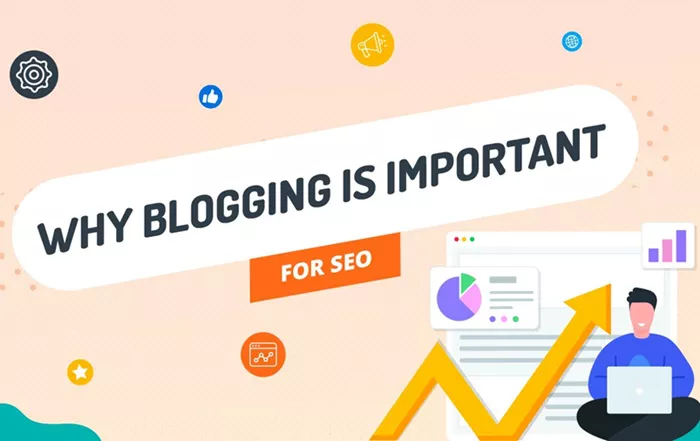Search Engine Optimization (SEO) is the cornerstone of digital marketing, helping businesses and individuals attract and engage audiences online. One of the most effective tools to enhance SEO efforts is blogging. A well-executed blog strategy can significantly improve a website’s visibility, authority, and engagement. Let’s dive deep into the reasons why blogging is important for SEO.
Improves Website Content Volume
Blogging adds fresh, valuable content to your website, which is a critical factor for SEO. Search engines prioritize websites that are updated frequently with relevant and quality content. Each blog post provides an opportunity to target new keywords, answer user queries, and expand your site’s reach.
For example:
If you own a fitness brand, posting blogs about workout tips, nutrition advice, or trends in fitness equipment can attract different audience segments.
These posts increase the breadth and depth of your content, enhancing your chances of appearing in search results.
Targets Long-Tail Keywords
While head keywords are highly competitive, long-tail keywords are more specific and less contested. Blogging allows you to focus on these long-tail keywords, catering to niche audiences. Long-tail keywords often align closely with user intent, which can lead to higher conversion rates.
For instance:
A generic keyword like “running shoes” might be hard to rank for, but a blog post titled “How to Choose Running Shoes for Marathon Training” targets a long-tail keyword that is more specific.
Blogs like these attract users who are closer to making a purchase decision, improving traffic quality.
Enhances Internal Linking Opportunities
Internal linking is an essential SEO tactic. Blogs provide ample opportunities to link to other pages on your site, helping search engines understand your website’s structure and relevance.
For example, a blog post on “Benefits of Yoga for Mental Health” can link to your yoga class schedules or product pages.
These internal links distribute link equity and keep visitors engaged on your website longer, signaling positive user experience to search engines.
Generates Backlinks
Quality blog content attracts backlinks, which are critical for improving domain authority. Other websites are more likely to link to a blog post with valuable insights, statistics, or unique perspectives than to a product page.
For example:
If you publish a comprehensive guide on “The Impact of Social Media on Modern Marketing,” it may be cited in other blogs, articles, or research papers.
Each backlink acts as a vote of confidence for your website, boosting its authority in the eyes of search engines.
Encourages Social Media Sharing
Blogs are inherently shareable content. A well-written blog post can be promoted on various social media platforms, increasing its reach and engagement. Social signals—likes, shares, and comments—may indirectly boost your SEO by driving traffic and increasing brand visibility.
A post titled “10 Best Travel Destinations for 2024” could resonate with audiences and go viral on platforms like Instagram, Facebook, or Twitter.
The increased exposure brings more visitors to your site, indirectly influencing your rankings.
Boosts Dwell Time and Reduces Bounce Rate
Search engines monitor how users interact with your site, including metrics like dwell time and bounce rate. High-quality blog content encourages users to stay longer and explore more pages, signaling relevance and value.
A blog featuring “Step-by-Step Guides to Home Gardening” might include images, videos, and infographics that engage readers for an extended period.
The longer visitors stay on your site, the better your SEO performance will be.
Establishes Authority and Expertise
Consistent blogging helps establish your brand as an authority in your field. Google rewards websites that demonstrate expertise, authority, and trustworthiness (E-A-T). Informative blog posts contribute to this perception, improving your chances of ranking higher.
For example, a legal firm blogging about “Recent Changes in Employment Laws” positions itself as a knowledgeable resource in the industry.
This credibility not only attracts users but also earns the trust of search engines.
Keeps Your Audience Engaged
Blogging creates a space to address your audience’s pain points, questions, and interests. Engaged users are more likely to convert, share your content, and return for more information.
A blog that solves problems, such as “How to Fix Common Plumbing Issues at Home,” will keep readers coming back for more.
Regular engagement fosters loyalty, an often overlooked component of successful SEO strategies.
Supports Voice Search Optimization
With the rise of voice-activated devices like Alexa, Siri, and Google Assistant, voice search optimization has become crucial. Blogs targeting conversational phrases and question-based queries improve your chances of being featured in voice search results.
For instance, a post titled “What Are the Health Benefits of Drinking Green Tea?” might directly answer questions posed in voice searches.
This alignment with voice search trends enhances your site’s visibility in evolving search landscapes.
Provides Analytics for Refinement
Blog performance metrics—such as traffic, time spent on page, and conversion rates—offer valuable insights. Analyzing these metrics helps refine your SEO strategy by identifying what works and what doesn’t.
If a post on “Top Digital Marketing Tools for Small Businesses” outperforms others, you can create similar content or update old posts to replicate its success.
Continuous optimization keeps your blog and website competitive in search rankings.
Conclusion
Blogging is more than just an outlet for creative expression—it’s a powerful SEO tool that improves content volume, targets specific keywords, builds authority, and drives engagement. In a world where search engines are the primary gateway to online information, maintaining a high-quality blog can set you apart from competitors.
Investing time and resources into blogging will not only enhance your search rankings but also foster a loyal audience, improve brand authority, and drive long-term success. So, if you haven’t already, now is the perfect time to make blogging an integral part of your SEO strategy.
Related Topics
- Social Media VS.Blogging Platform: Which is Better?
- 10 Things You Should Know When You Started Blogging
- How to Start a Blogging Business: A Comprehensive Guide

